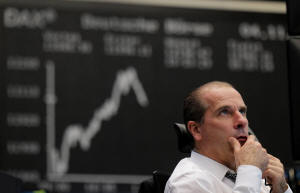World stocks waver as investors catch central bank jitters
 Send a link to a friend
Send a link to a friend
 [January 31, 2023] By
Nell Mackenzie [January 31, 2023] By
Nell Mackenzie
LONDON (Reuters) -World stocks stumbled and bond yields edged lower on
Tuesday as hotter than anticipated European inflation numbers jangled
investor nerves ahead of a slew of earnings reports, central bank
meetings, and key U.S. economic data.
Investors broadly expect the U.S. Federal Reserve to raise interest
rates by 25 basis points (bps) on Wednesday. Interest rate announcements
are also due on Thursday from the Bank of England and the European
Central Bank - and both are expected to hike rates by 50 bps.
Meanwhile, more than 100 S&P 500 companies, including Apple, Amazon.com
and Google parent Alphabet, are expected to report results this week,
which also includes the release of closely watched U.S. employment
numbers.
Tuesday sees the release of fourth-quarter labour costs, while Friday
brings the all-important January non-farm payrolls report.
"Reality is setting in," said Bruno Schneller, a managing director at
INVICO Asset Management in Zurich.
Equity markets may have factored in the end of central bank rate hikes,
but they do not yet reflect the potential hit to earnings from a slowing
economy, Schneller said.

"Recent corporate results, especially 2023 guidance, indicate a negative
outlook leading us to maintain a reduced position in equities," he said.
"In the shorter term, there doesn't appear to be an obvious safe haven
for investors," said Schneller.
European shares dropped on Tuesday, dented by healthcare stocks, with
the Euro Stoxx index down 0.8%, Germany's DAX falling 0.7% and the FTSE
0.8% lower. U.S. stock futures, the S&P 500 e-minis, were down 0.4%.
"This whole week is about rate hikes but from a credit markets point of
view, credit spreads have traded back to the pre-Ukraine invasion
levels," said Azhar Hussain, head of global credit at Royal London Asset
Management.
Credit spreads, the difference between the yields of two different debt
instruments with the same maturity, are often taken by traders to
indicate market stability and company financial health.
[to top of second column] |

A stock trader looks at his monitors as
the German share price index DAX reacts to the U.S. 2020
presidential election at the stock exchange in Frankfurt, Germany,
November 4, 2020, REUTERS/Kai Pfaffenbach

"Over the last 12-months, yields have traded much higher than
predicted a year ago. Compare that to valuations and the two are out
of sync," said Hussain.
"Where investors should feel more nervous is with company
valuations," he said.
U.S. stock futures fell, pointing to a lower open for the benchmark
indexes following Monday's losses.
At the end of the Fed's two-day policy meeting on Wednesday,
investors will be glued to Chair Jerome Powell's news conference for
clues on whether the rate-hiking cycle may be coming to a close, and
for signs of how long rates could stay elevated.
U.S. Treasury yields edged lower ahead of the central bank meetings
and economic data, with the benchmark 10-year note down 3 bps at
3.522%.
The two-year yield, which rises with traders' expectations of higher
Fed fund rates, fell 3 bps on the day to 4.226%.
In currencies, the U.S. dollar index, which was poised for its
fourth month of declines, was up 0.2% at 102.44 against a basket of
other major currencies.
The euro fell 0.1% to $1.0835, but was still heading for a gain of
1% this month.
In the energy market, oil prices fell ahead of the expected hikes by
central banks and on the back of data that showed Russian exports
are rising, despite international sanctions.
Brent crude fell 1% to $84.08 per barrel.
Spot gold also dropped 1% to $1,902.68 per ounce, driven lower by a
stronger dollar. [GOL/]
(Additional reporting by Julie Zhu; Editing by Emelia
Sithole-Matarise and Mark Potter)
[© 2023 Thomson Reuters. All rights
reserved.]
This material may not be published,
broadcast, rewritten or redistributed.
Thompson Reuters is solely responsible for this content. |